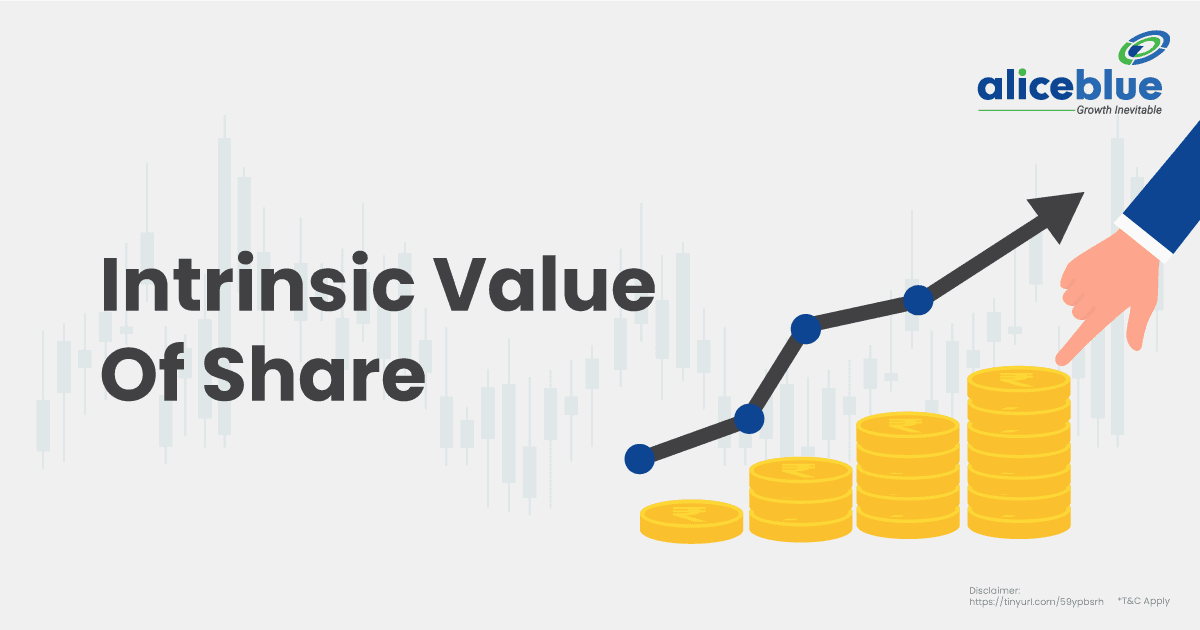Intrinsic value of a share is the perceived true value of a company’s stock, based on fundamental analysis. It considers factors like future earnings, dividends, and growth potential, aiming to determine the stock’s value independent of current market prices and speculative factors.
Content Id:
- What Is Intrinsic Value Of Share?
- Intrinsic Value Example
- How To Calculate Intrinsic Value Of Share
- Intrinsic Value Of Share Method
- Intrinsic Value Of Share – Quick Summary
- Intrinsic Value Of Shares Meaning – FAQs
What Is Intrinsic Value Of Share?
Intrinsic value of a share is an estimate of the actual worth of a stock, derived from fundamental analysis. It assesses factors such as the company’s financial performance, assets, liabilities, and growth prospects, to determine the stock’s value independent of market fluctuations.
Intrinsic value of a share is a theoretical calculation of a stock’s real value. It’s based on objective analysis, considering the company’s earnings, dividends, and growth. This method aims to find the stock’s true worth, beyond market price influences.
This value is crucial for investors, guiding them in identifying undervalued or overvalued stocks. By comparing the intrinsic value to the market price, investors can make more informed decisions about buying or selling shares, seeking investments that offer long-term value.
For example, if fundamental analysis suggests that a company’s stock is worth ₹200 based on its financials, growth potential, and industry position, but it’s currently trading at ₹150 in the market, the stock is considered undervalued, with its intrinsic value higher than the market price.

Intrinsic Value Example
Consider a company whose stock trades at ₹500, but after analyzing its earnings, debt levels, and future growth prospects, an investor calculates its intrinsic value to be ₹400. In this case, the stock is overvalued in the market compared to its estimated true worth.
How To Calculate Intrinsic Value Of Share
To calculate the intrinsic value of a share, methods like Discounted Cash Flow (DCF) are used, where future cash flows are estimated and discounted to their present value. Other approaches include using financial ratios like P/E or P/BV in comparison with industry averages.
Discounted Cash Flow (DCF)
Intrinsic Value=∑(Future Cash Flow n / (1+Discount Rate) N )
Price-to-Earnings (P/E) Ratio Method
Intrinsic Value per Share = Earnings per Share × Average Industry P/E Ratio × Growth Rate
Price-to-Book Value (P/BV) Ratio Method
Intrinsic Value per Share = Book Value per Share × Average Industry P/BV Ratio× Growth Rate
Intrinsic Value Of Share Method
The Intrinsic Value of Share method involves estimating a stock’s real worth based on fundamental analysis. It typically uses techniques like Discounted Cash Flow (DCF) to project future earnings to present value or financial ratios compared with industry standards to gauge a company’s underlying economic value.

To understand the topic and get more information, please read the related stock market articles below.
| Forward Rate vs Spot Rate |
| Price to Book |
| PE Vs PB Ratio |
| Types of Spot Markets |
| Sweat Equity Shares |
| What is ESOP |
| Types Of Treasury Bills In India |
| What Is Fair Value In Stocks? |
| Types Of Earnings Per Share |
Intrinsic Value Of Share – Quick Summary
- Intrinsic value of a share reflects its true value, calculated through fundamental analysis. This considers the company’s financial health, growth potential, and assets versus liabilities, aiming to establish the stock’s real value, unaffected by market volatility.
- Calculating a share’s intrinsic value often involves the Discounted Cash Flow method, projecting and discounting future cash flows and dividends. Alternatively, financial ratios such as P/E or P/BV, benchmarked against industry averages, are also used for estimation.
- Open free demat account with Alice Blue in 15 minutes today! Invest in Stocks, Mutual Funds, Bonds & IPOs for Free. Also, trade at just ₹ 15/order and save 33.33% brokerage on every order.
Intrinsic Value Of Shares Meaning – FAQs
What Is Intrinsic Value Of Share?
Intrinsic value of a share is a calculation that attempts to determine the true value of a stock, based on the company’s fundamental financial metrics and growth prospects, independent of current market price fluctuations.
What is an example of intrinsic value?
An example of intrinsic value is when an investor calculates a company’s stock to be worth ₹100 based on its earnings and growth potential, even though it’s currently trading at ₹80 in the stock market.
How is intrinsic value calculated?
Intrinsic value is calculated using methods like Discounted Cash Flow (DCF), where future cash flows are estimated and discounted to present value, or by comparing financial ratios like P/E or P/BV to industry averages.
What is intrinsic value vs market value of shares?
The main difference between intrinsic and market value of shares is that intrinsic value is based on fundamental analysis of the company’s financials, while market value is the current trading price of the shares in the stock market.
What is a good intrinsic value?
A good intrinsic value is subjective and varies by investor perspective. Generally, it’s considered favorable when it’s significantly higher than the current market price, indicating potential undervaluation and a promising investment opportunity, given sound financial analysis.
Does gold have intrinsic value?
Yes, gold has intrinsic value, derived from its physical properties like durability, rarity, and universal acceptance as a store of value. This gives it a perceived worth independent of economic conditions or currency value.
We hope that you are clear about the topic. But there is more to learn and explore when it comes to the stock market, commodity and hence we bring you the important topics and areas that you should know:






